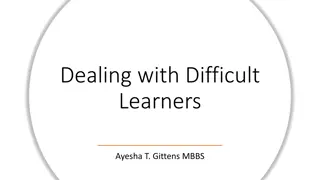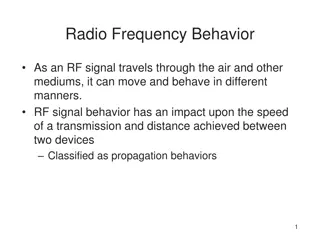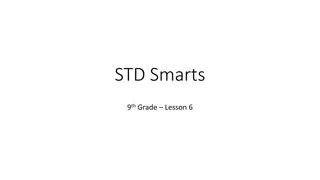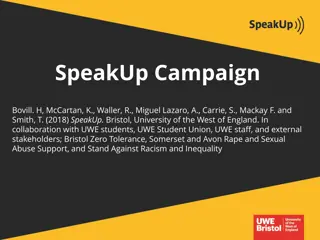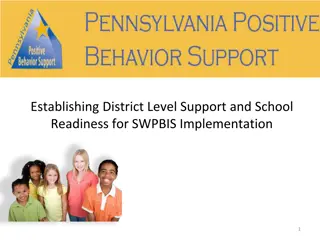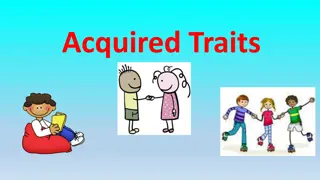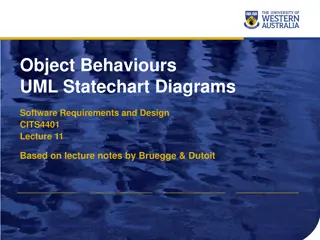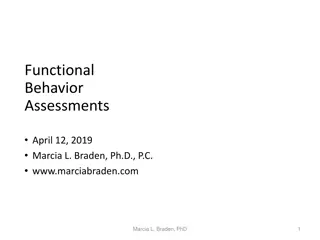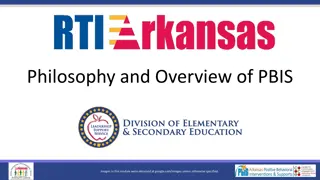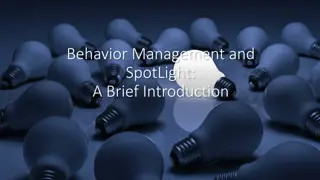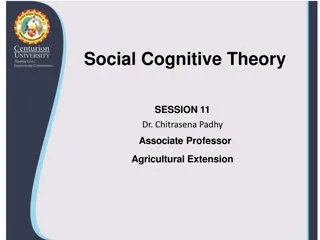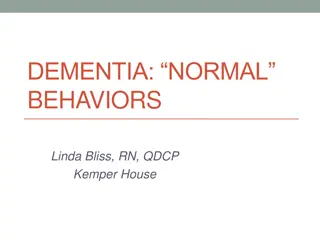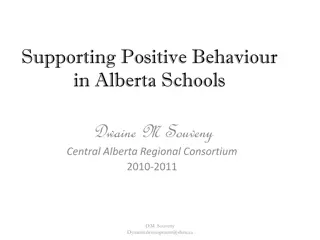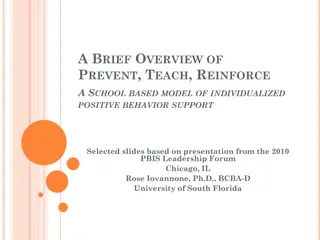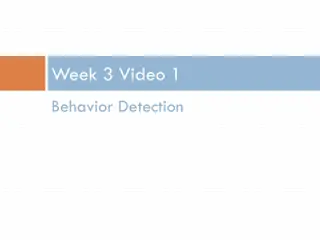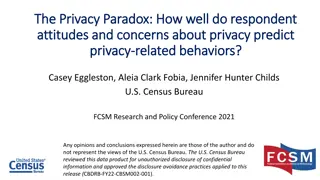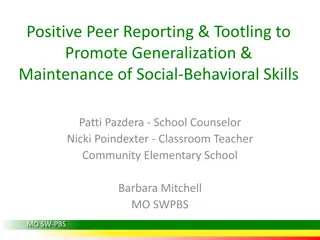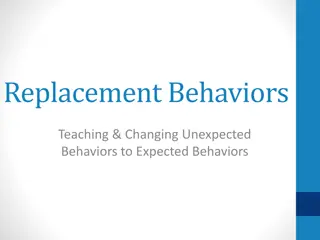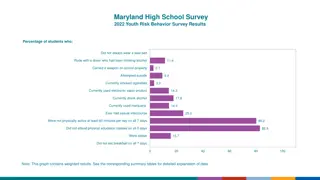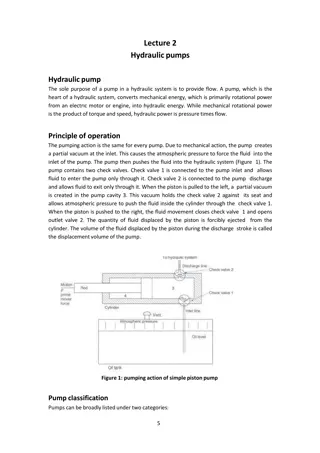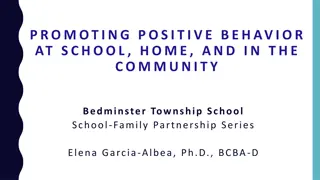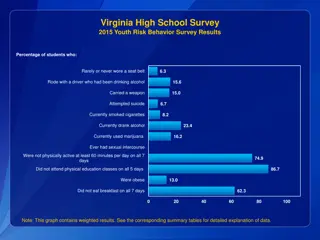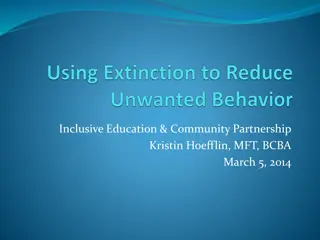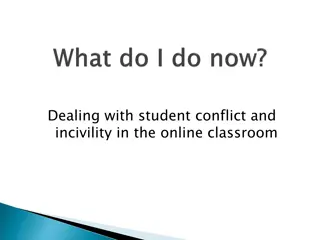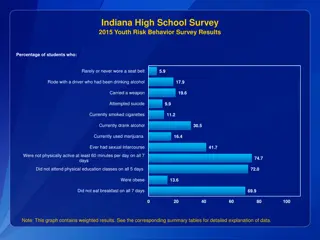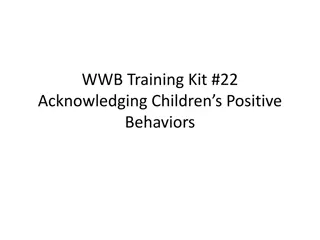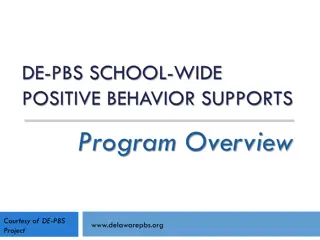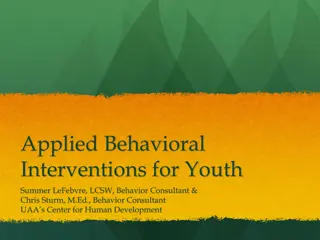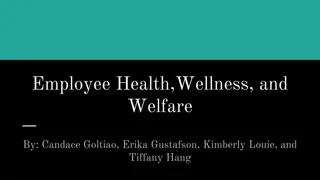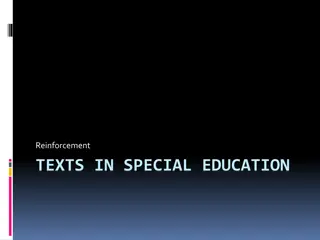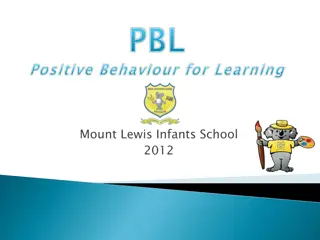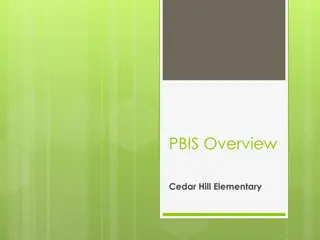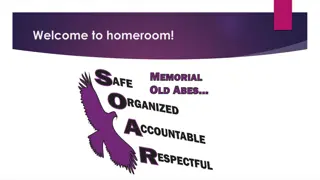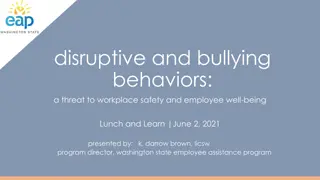Understanding and Managing Difficult Learner Behaviors in Adult Education
Dealing with difficult learners in adult education settings can impact the learning experience for all. This guide covers types of challenging behaviors, identifying underlying causes, and strategies for maintaining a constructive educational environment. By addressing disruptive behaviors effective
1 views • 32 slides
Understanding Changes in Domestic Abuse Practices Over the Last 2 Years
In the realm of domestic abuse and coercive control, there have been notable developments in practice over the past two years. From defining behaviors that constitute domestic abuse to recognizing economic abuse and the impact of coercive and controlling behaviors, the legal landscape has evolved to
6 views • 30 slides
Positive Behavior Management Strategies for Lunchtime Supervisors
Explore effective methods for managing student behavior during lunchtime supervision. Develop skills in building relationships, motivating students, addressing behavioral issues, and self-assessment. Understand the causes of positive and negative behaviors, consider Maslow's hierarchy of needs, and
3 views • 13 slides
Understanding Radio Frequency Behavior and Propagation Behaviors
Radio frequency signals exhibit various behaviors as they travel through different mediums, affecting transmission speed and distance between devices. Propagation behaviors include absorption, reflection, scattering, refraction, and diffraction, impacting wireless network performance. Understanding
2 views • 32 slides
STD Smarts 9th Grade Lesson: Risky Behaviors and STD Testing
In this 9th grade lesson on STD Smarts, students explore risky behaviors related to STD transmission and delve into the importance of STD testing. The lesson covers various scenarios and myths surrounding STDs, challenging students to consider their choices and knowledge about sexual health. Through
0 views • 32 slides
Understanding Sexual Violence and Harassment in Educational Settings
Sexual violence and harassment, including rape, sexual assault, and unwanted sexual behaviors, are serious issues that can affect anyone. This content highlights what sexual violence is, who can experience it, and the impact it has on students in educational environments. It also covers sexual haras
1 views • 27 slides
SWPBIS Implementation: Establishing District Support and School Readiness
Positive Behavioral Interventions and Supports (PBIS) focuses on creating effective environments to encourage appropriate behaviors. SWPBIS extends this approach to whole schools, applying systemic strategies to achieve positive outcomes and prevent problem behaviors. It is not a quick fix or just a
2 views • 18 slides
Understanding Multiple Baseline Designs in Behavioral Experiments
Multiple Baseline Designs are a type of experimental design used in behavioral research. This design involves measuring two or more behaviors concurrently in a baseline condition, applying a treatment variable to one behavior at a time while maintaining baseline conditions for others, and then seque
0 views • 34 slides
Managing Difficult Employees and Disruptive Behaviors
Identify common types of difficult and disruptive employee behaviors, discuss the potential impact on the organization, and offer tips for constructive management in the workplace. Explore behaviors like gossiping, incivility, bullying, insubordination, and arrogance. Understand the metrics and lega
1 views • 20 slides
Understanding Acquired Traits and Learned Behaviors in Living Organisms
Acquired traits are physical characteristics acquired during a living thing's lifetime, such as scars, and are not passed down from parents. Many acquired traits are also learned behaviors, like reading or flying, which animals develop after birth. Learned behaviors, unlike inherited instincts, are
5 views • 15 slides
Understanding Object Behaviors and Statechart Diagrams in Software Design
Object behaviors and UML statechart diagrams play a crucial role in software requirements and design. State machines, transitions, events, and states are essential concepts in modeling object behavior in response to external events. By utilizing UML statechart diagrams, one can effectively represent
0 views • 23 slides
Understanding Functional Behavior Assessments for Supporting Students
Functional Behavior Assessments (FBAs) play a crucial role in supporting students with behavioral needs by identifying the reasons behind inappropriate behaviors. This approach, led by professionals like Marcia L. Braden, Ph.D., helps define interventions, prevent problems, and teach alternative beh
1 views • 51 slides
Transforming School Culture Through Positive Behavior Interventions and Supports
Explore the philosophy, challenges, and solutions in implementing Positive Behavior Interventions and Supports (PBIS) in schools. Discover the importance of changing school culture, addressing student behaviors effectively, and creating a supportive learning environment. Learn how PBIS can enhance s
0 views • 39 slides
Understanding Behavior Management and SpotLight System in Schools
This overview introduces Behavior Management and SpotLight in educational settings, emphasizing the importance of a positive behavior intervention system like SpotLight for effective school-wide management. It discusses the features, benefits, users, and methods of utilizing SpotLight to address var
0 views • 13 slides
Understanding Social Cognitive Theory: Insights from Albert Bandura
Social Cognitive Theory, developed by Albert Bandura, emphasizes learning through observation and modeling behaviors. The theory explores how individuals acquire new behaviors, thoughts, and attitudes by observing others. Bandura's famous Bobo doll experiment showcased how children imitated aggressi
6 views • 17 slides
Enhancing Workplace Happiness Through Positive Attitudes and Passion
Explore the key elements of workplace happiness, including positive attitudes, passion for the job, and creating a positive work environment. Learn how recognizing positive and negative behaviors can impact happiness levels in the workplace. Discover strategies for renewal and fostering employee eng
0 views • 26 slides
Understanding Normal Behaviors in Dementia Care
Dementia presents a range of normal behaviors that can be challenging for caregivers. By learning to identify triggers, interpret communication, and respond effectively, caregivers can provide better support for individuals with dementia. This session explores common behaviors like aggression, wande
0 views • 29 slides
Supporting Positive Behavior in Alberta Schools: Key Elements and Strategies
This content discusses strategies for supporting positive behavior in schools, focusing on key elements such as positive relationships, learning environment, differentiated instruction, understanding student behavior, and social skills instruction. It emphasizes the importance of positive reinforcem
1 views • 37 slides
School-Based Model of Individualized Positive Behavior Support
A brief overview of the Prevent-Teach-Reinforce (PTR) model presented at the 2010 PBIS Leadership Forum in Chicago, highlighting the 5-step Tier 3 support model, critical components of behavior support, team evaluation, goal setting, and operational definitions of behaviors and replacements. The mod
0 views • 24 slides
Understanding Behavior Detection Models in Educational Settings
Explore how behavior detectors automatically infer student behaviors from interaction logs, such as disengaged behaviors like Gaming the System and Off-Task Behavior, as well as Self-Regulated Learning (SRL) behaviors like Help Avoidance and Persistence. Discover the goal of identifying these behavi
0 views • 18 slides
Understanding the Privacy Paradox: Attitudes vs. Behaviors
Social scientists have identified a Privacy Paradox where individuals with strong privacy concerns may not always engage in behaviors that protect their privacy. While some studies show a discrepancy between attitudes and behaviors, others suggest that privacy-concerned individuals do employ privacy
0 views • 14 slides
Social-Behavioral Skill Enhancement Strategies in Education
Methods like Positive Peer Reporting (PPR) and Tootling are discussed to improve social interactions and alter the social status of students facing challenges in social, emotional, and behavioral aspects. Strategies aim to promote positive behaviors, enhance peer relationships, and create a conduciv
0 views • 25 slides
Understanding Replacement Behaviors in Behavioral Interventions
Dive into the concept of replacement behaviors in behavior modification strategies. Learn how to identify, teach, and implement expected behaviors to replace unwanted actions. Discover the role of the Child Study Team in developing action plans, prioritizing behaviors, and evaluating progress. Explo
0 views • 30 slides
Maryland High School Survey 2022 Youth Risk Behavior Results
The Maryland High School Survey 2022 Youth Risk Behavior Results provide insights into students' behaviors. Key findings include percentages and numbers of students who engage in risky behaviors such as not wearing seat belts, riding with drivers who drink alcohol, carrying weapons, attempting suici
0 views • 4 slides
Understanding Hydraulic Pumps: Types and Functions
Hydraulic pumps are essential components in hydraulic systems, converting mechanical energy into hydraulic energy to provide flow. There are two main categories of pumps - non-positive displacement pumps and positive displacement pumps. Non-positive displacement pumps, such as centrifugal pumps, wor
0 views • 7 slides
Promoting Positive Behavior in School, Home, and Community
This presentation by Elena Garcia-Albea, Ph.D., BCBA-D, focuses on promoting positive behavior in school, home, and the community. It covers strategies like teaching and reinforcing replacement behaviors, preventing unwanted behaviors, and understanding the reasons behind behavior. The goal is to cr
0 views • 14 slides
Virginia High School Survey 2015 Youth Risk Behavior Results
The Virginia High School Survey 2015 presented data on various risky behaviors among students, including seat belt usage, alcohol and drug consumption, weapon carrying, suicide attempts, physical activity, sexual activity, and more. The results are divided into percentages of students engaging in th
0 views • 4 slides
Positive Hallway Behaviors and Procedures for a Respectful School Environment
Promoting a positive school environment through SOAR expectations emphasizing safe, organized, accountable, and respectful behaviors in hallways and common areas. Guidelines include moving appropriately, keeping areas clear, using appropriate language, and demonstrating consideration for others duri
0 views • 7 slides
Understanding Behavior Establishment and Extinction in Inclusive Education
Behavior establishment and extinction are crucial concepts in the field of inclusive education. Behaviors are reinforced based on antecedents and consequences, with extinction occurring when reinforcement is discontinued. Different types of extinction target behaviors maintained by positive or negat
0 views • 25 slides
Dealing with Student Conflict and Incivility in Online Classrooms
Classroom incivility encompasses disruptive behaviors that hinder a conducive learning environment. It affects both students and instructors, leading to stress and discontent. Various uncivil behaviors include dominating discussions, challenging instructors, disputes between students, and demeaning
0 views • 19 slides
Indiana High School Survey 2015 Youth Risk Behavior Results
The Indiana High School Survey 2015 provides valuable insights into the risk behaviors of high school students in Indiana. The survey results reveal concerning percentages of students who engage in behaviors such as not wearing seat belts, riding with drivers who have consumed alcohol, carrying weap
0 views • 4 slides
Understanding Positive Behavior Acknowledgment in Children
Acknowledging children's positive behaviors is crucial for reinforcing desired behavior patterns. Positive responses help in promoting positive interactions, following instructions, proper communication, and independent self-care skills. It is important to recognize and praise positive behaviors to
0 views • 11 slides
Positive Behavior Support Program Overview
School-Wide Positive Behavior Support is a systems approach that aims to establish a positive social culture and individualized behavioral support in schools to enhance both social and academic success for all students. It focuses on preventing problem behaviors through teaching positive social expe
0 views • 27 slides
Understanding Applied Behavior Analysis (ABA) for Youth Interventions
Applied Behavior Analysis (ABA) is a science focusing on improving human behavior by increasing desired behaviors, teaching new skills, and generalizing behaviors. ABA emphasizes observable behaviors, measurement of behavior change, and the use of interventions in various settings like classrooms an
0 views • 25 slides
Employee Health, Wellness, and Welfare Study: The Impact of Prosocial Behavior on Positive Affect
This study explores the connection between employees' perceived prosocial impact at work and their positive affect at home. By analyzing data collected from firefighters and rescue workers, the researchers found that positive work reflection and perceived competence play a crucial role in influencin
0 views • 32 slides
Understanding Positive and Negative Reinforcement in Special Education
Positive reinforcement involves rewarding good behavior in children, such as praise or rewards, while negative reinforcement motivates change by removing something unpleasant. Positive reinforcement is usually more effective and includes examples like praising a child for putting away dishes or rewa
1 views • 5 slides
Positive Behaviour for Learning at Mount Lewis Infants School
Positive Behaviour for Learning (PBL) is a proactive system implemented at Mount Lewis Infants School to teach and encourage positive behaviors among students. The initiative focuses on safety, respect, and fostering a positive learning environment through explicit teaching, modeling, and reinforcem
0 views • 16 slides
Understanding PBIS: Positive Behavior Supports at Cedar Hill Elementary
Explore the Positive Behavioral Interventions and Supports (PBIS) program at Cedar Hill Elementary through an informative presentation covering the program overview, purposes, principles, components, and mission statement. Discover how PBIS fosters a positive school environment by promoting expected
0 views • 24 slides
Homeroom Information and Guidance for High School Students
This homeroom session provides valuable information on the school's tardy policy, SOAR matrix, positive hallway behaviors, academic and career planning options, credit options including Project Lead the Way, transcripted credits, and AP credits. It emphasizes the importance of avoiding tardiness thr
0 views • 19 slides
Workplace Safety and Well-being Lunch and Learn Event Overview
This Lunch and Learn event held on June 2, 2021, addressed disruptive and bullying behaviors as threats to workplace safety and employee well-being. Key topics included identifying, addressing, and discussing such behaviors, along with statistics on civility in the workplace and challenges faced due
0 views • 26 slides
